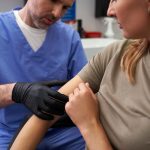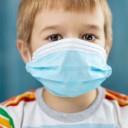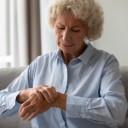-
Physical Activity Linked to Lower Colon Cancer Recurrence
Participating in a structured exercise program after treatment was associated with a reduced risk of recurrence in people who had colon cancer.
by Sandra Gordon
-
Gaps in Survivorship Care Leave Unmet Needs After Cancer Treatment
A survey of head and neck cancer survivors reveals that many are not getting adequate survivorship care and may not even know it is available.
by Cameron Walker
-
Redefining Cancer Survivorship
As people with advanced disease live longer, they face physical and mental health side effects. Patient advocates say research and care must focus on their unique needs.
by Thomas Celona
-
Melanoma Risk in Childhood Cancer Survivors
People treated for childhood cancer found to have twice the risk of developing melanoma as an adult.
by Cameron Walker
-
Putting the Patient in the Driver’s Seat
In her new book, Cancer Support Community executive chair Kim Thiboldeaux offers advice to patients on how to steer their way through a cancer diagnosis, treatment and beyond.
by Kevin McLaughlin
-
Rethinking Access to Disability Benefits
Advances in screening and treatment mean there are more cancer survivors than ever, but survivors who struggle to work can face difficulty getting disability payments.
by Jen Tota McGivney
-
Should All Kids With Cancer Get Genetic Testing?
Testing children with cancer for hereditary mutations could impact their treatment and provide information relevant to other family members.
by Marcus A. Banks
-
Understanding How Radiation Causes Cancer
Researchers are investigating who is at greatest risk for radiation-induced cancers.
by Kate Yandell
-
How Long Do Immunotherapy Side Effects Last?
For people with melanoma who receive immune checkpoint inhibitors after surgery, side effects can remain even after treatment has been completed. These chronic side effects are most often mild.
by Anna Goshua
-
Chemobrain: It’s Not Your Imagination
Scientists discussed the mechanisms of chemotherapy-related cognitive impairment at a session dedicated to symptom science at the AACR Annual Meeting 2021.
by Marci A. Landsmann
Cancer Talk
Treatment Combination Improves Survival in EGFR-positive Lung Cancer
Adding chemotherapy to targeted therapy improves outcomes for people with advanced EGFR-positive non-small cell lung cancer.
by Sandra Gordon
Lessons From 20 Years Living With CancerMultiple myeloma survivor Jonathan Gluck reflects on uncertainty, and the scientific progress that has kept him living with cancer for more than two decades.
by Eric Fitzsimmons
The Enduring Importance of Cancer Disparities ResearchOpening session from AACR conference highlights how perseverance and adversity have informed cancer disparities research over the years.
by Eric Fitzsimmons
Most Cancer Survivors Don’t Meet Healthy Diet GoalsDespite research linking fruits and vegetables to cancer survival, many people do not change their eating habits after diagnosis.
by Darlene Dobkowski














